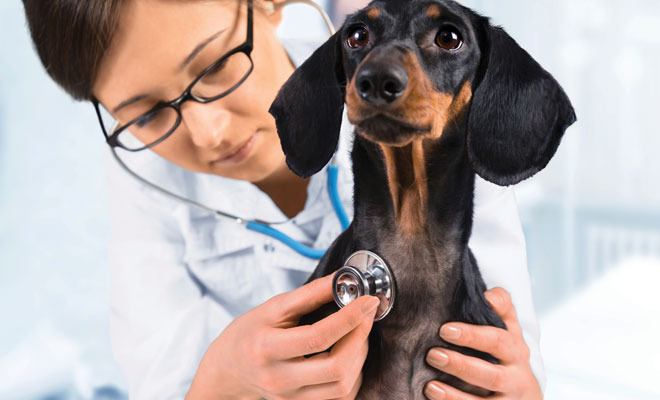
Caring for Your Aging Pet
Most veterinary professionals agree that obesity in pets is a huge health concern and one that actually ages animals faster. Obesity in pets can lead to health issues, and can also cause physical changes such as aching joints and lack of energy.
Pets are such an important part of our lives. Whether it’s their companionship or unconditional love, pets have a way of wiggling, swimming or flying deep into our hearts and firmly embedding themselves into our lives. Many pet owners view their cherished critters as members of the family and include them in every facet of their life just as they would a human family member. But just as humans do, pets age, and along with that process come issues and changes that owners need to be mindful of.
Often pet owners calculate how old their pets are based on the formula of their age compared to human age. Specifically with dogs, the conventional wisdom is that one dog year equals seven human years. Although a dog’s age averages out this way, there is quite a bit of variation, some of which is based on the size of the dog. For example, dogs mature more quickly than children in the first couple of years. Thus, the first year of a dog’s life is equal to about 15 human years, rather than seven. As a general rule of thumb, dogs and cats are considered “senior” around age seven. These calculations are simply approximations because, just like humans, there are many variables that affect aging. Pet owners also should take into consideration that just because their dog is ten and may be designated a canine senior citizen doesn’t mean he or she won’t be living an active and healthy life.
With other pets, the aging formula is a little harder to pin down, but we have the opportunity to enjoy our pets longer than ever thanks to better veterinary care and the more advanced nutrition that’s available today. You have an active part in how your pet ages; educating yourself on what to expect as your pet gets older will help make the journey through the golden years a more pleasant experience for both of you.
Health Issues in Older Pets
There are many age-related challenges that your pet will face as they get older. Pets can become senile and weak in their old age, and some breeds are more prone to certain bone issues and respiratory or gastric problems. Both dogs and cats can develop heart or liver disease and some have diabetes or vision problems. Many aging pets develop tumors or growths, some of which can be cancerous. Regular visits to your vet will help you monitor your pet’s aging process and provide you with information to keep your pet as healthy and active as possible.
Most veterinary professionals agree that obesity in pets is a huge health concern and one that actually ages animals faster. Obesity in pets can lead to health issues, and can also cause physical changes such as aching joints and lack of energy. On the opposite end of the spectrum, diseases such as cancer, kidney failure and diabetes mellitus can cause weight loss along with other symptoms and must be addressed for optimal health.
Be Aware of Changes
As pets grow older, you can anticipate that normal behaviors will become altered. Noticing such changes and mentioning them to your vet when appropriate will help in proper diagnosis of impending issues. Occasionally your pet may exhibit odd behavior, such as appearing not to hear one moment and being overly sensitive to a strange noises the next. Such seemingly “selective listening” is not uncommon in aging animals.
Other behavioral changes you may see include incontinence or a decrease in self-grooming. The animal may develop a difference in sleep patterns, an increase in wandering, or some disorientation. There may be an escalation of irritability; the pet may not mind you as well as before, or display heightened levels of anxiety or decreased sociability.
This is just a brief list of possible changes, but owners seem to know their pets best and should not hesitate to report any major changes to their veterinarian as they arise. Should your pet show other symptoms such as chronic stiffness, loss of appetite, a change in coat, pain, growths, confusion, disinterest in their surroundings, a major weight change or similar issues, a call to the vet is warranted. These can indicate a serious health problem and it’s best to seek medical help for your pet as soon as possible.
Gold Golden Years
All pet owners can agree that their beloved pets “never live long enough.” But with the improvements in pet foods that provide optimal nutrition, immunizations, easier control of parasites and more advanced veterinary care and surgical options, our pets have a much better shot at truly having those last years be golden. It may take some changes in an owner’s lifestyle to accommodate their aging process, but when pet parents consider the joy their pets bring to their lives, it’s all worth it. When we lovingly supply the added assistance to help them be as comfortable and as content as possible, we add a bit of gold to those golden years.







